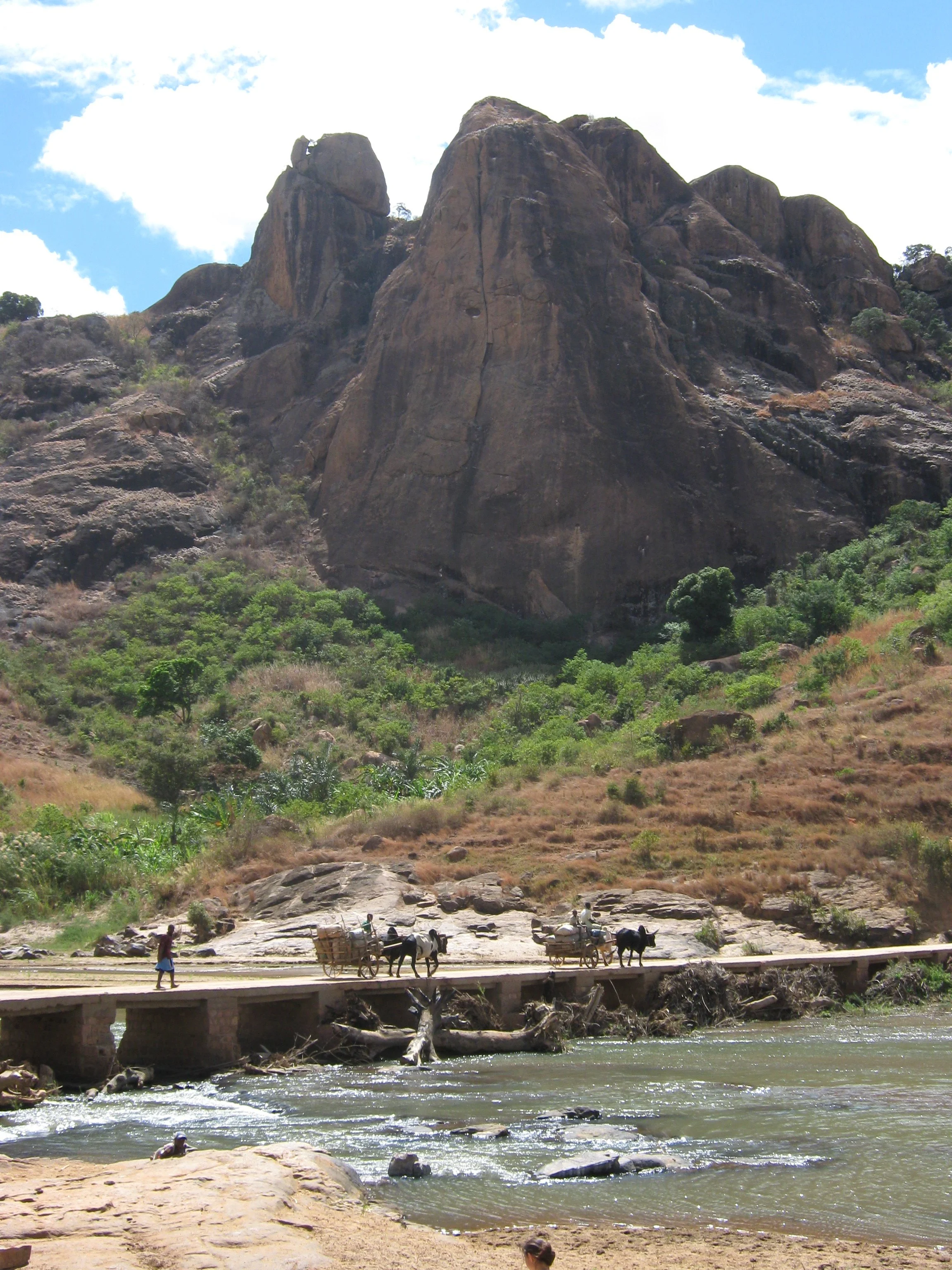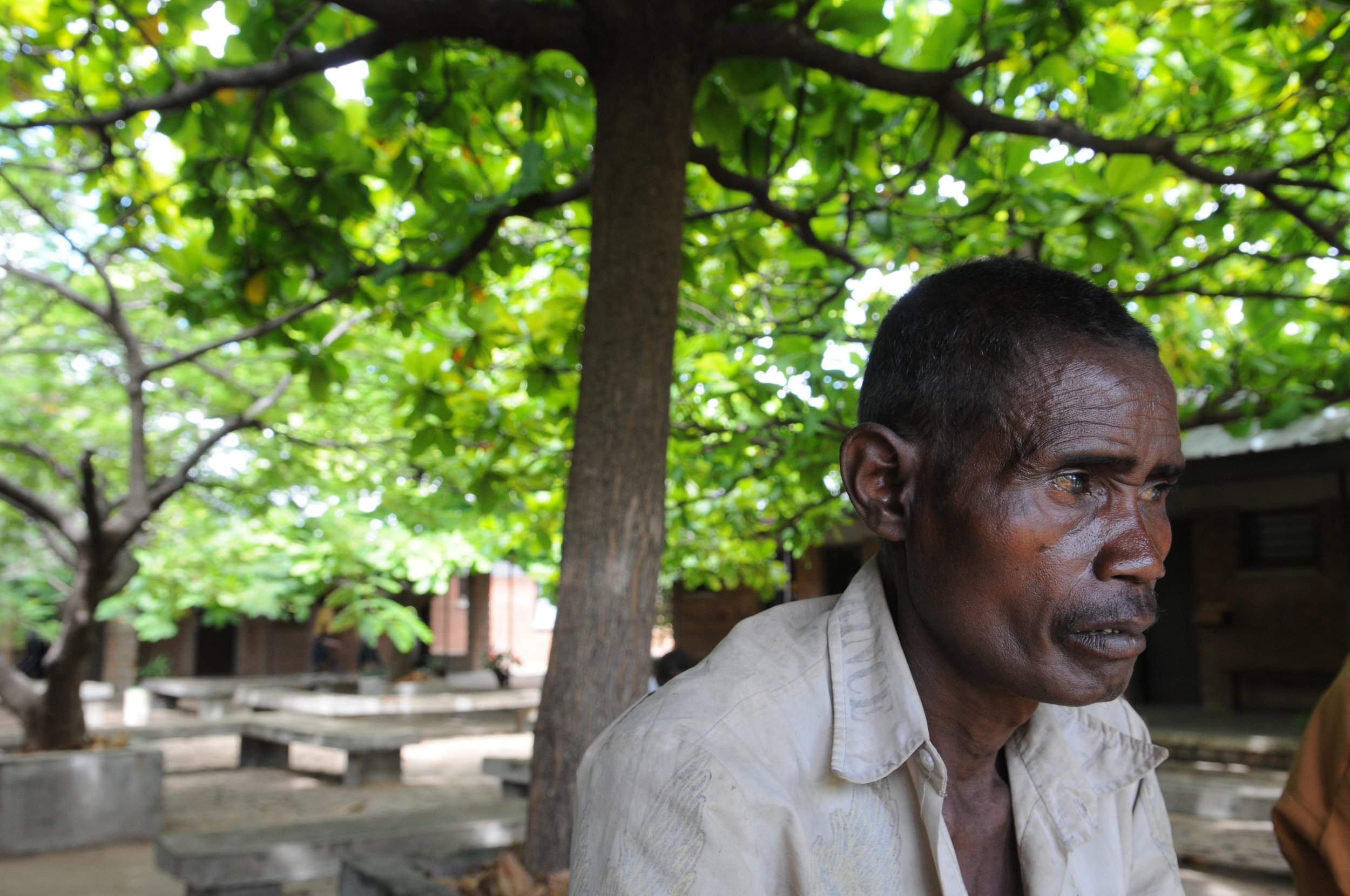John wakes up with his alarm - it’s 6am in London and he has a long commute on the Piccadilly line.
Jean Pierre wakes up with the sunshine - it’s 5am in Beangezoka and he has 4km to walk to get to his fields.
On his way out of the house, John clutches his chest. It’s happening again, that pain he had last week is back and it’s worse than ever. His wife Mary sees how pale he looks and decides to call an ambulance.
On his way to the fields, Jean Pierre gets the pain again. It’s worse than ever, this time he can barely breathe and he just has to sit down on a rock. 2 hours later some young men from his village are passing, and they help him walk home.
The ambulance crew arrive at John’s house 15 minutes later. They give him oxygen, perform an ECG and decide he needs to be transferred to A&E immediately for urgent assessment.
That evening Jean Pierre lies sweating and breathless in his bed, whilst his wife Marie discusses with her mother what to do. Jean Pierre’s been getting weaker for months. The ointment of spices and bitter leaves she has made for him to rub on doesn’t seem to have helped - maybe they should go to hospital? But hospitals are expensive. Do they have enough money? If they go to hospital now, who will get the fields cleared ready for the rainy season? There’s so much to do on their land. But if Jean Pierre can’t work they probably won’t be able to finish it all anyway. Let’s try the hospital, they decide.
25 minutes later, John sees the entrance of Northwick Park Hospital, the reassuring blue NHS sign flashing past outside the window of the ambulance. Mary follows in their car with overnight bags.
It’s dangerous to travel at night, so the next day Jean Pierre is loaded onto the sarety (ox-cart) of a neighbour who’s taking his tomato harvest into market. The hard wooden floor of the cart is agony on Jean Pierre’s back as he’s bounced over every jolt and pothole of the unpaved road, but it’s better than trying to walk 12km when you’re out of breath just standing up. 6 hours later he sees a sign overhead as the cart bounces through a gateway: Hopitaly Vaovao Mahafaly - the Good News Hospital.
John has a short wait in the ambulance bay whilst a bed is cleared for him in resus but the paramedics have phoned ahead and he’s a high priority case. Almost before he knows it he’s in a bed and a swarm of medical professionals descend on him. Bloods are taken, monitors attached, he’s given oxygen. 3 ECGs are performed in quick succession and one of the A&E doctors fast bleeps cardiology whilst the HCA helps John change into a hospital gown and the sister in charge asks when he last ate or drank. As the monitors beep and people race around him John feels rather like an F1 car in the pit lane.
The security guard at the Good News Hospital looks at Jean Pierre and decides he’s not got any obvious wounds and isn’t making too much of a fuss so sends him to sit in outpatients. By this point he’s so breathless and exhausted that he just lies down on the floor outside the consultation room. 40 minutes later Journal Club finishes and the missionary doctor who’s seeing outpatients this afternoon strolls over. She immediately notices that Jean Pierre’s not in a good way and sends her translator off to find a wheelchair and get him round to the ward.
The cardiology registrar has John’s ECGs in front of him and is speaking to his consultant to activate the angiography suite. Meanwhile his SHO is waving a consent form in front of John and Mary and explaining he’s having a massive heart attack (“myocardial infarction”) and needs an urgent procedure to re-open the blocked artery. It’s a matter of life and death and every minute is vital so if they could just sign here… John doesn’t really understand, everything’s just moving so quickly. Everyone is referring to him as “Bed 3” and he suddenly feels very scared.
With Elliette’s help translating, Dr Emma listens to Jean Pierre’s story. It sounds very much like he’s been having cardiac problems which have gone untreated for months and he’s now developing overt heart failure. Unfortunately, the ECG machine has run out of paper, after the hospital’s usual supplier in Tana went out of business. But the clinical picture is clear enough. In an ideal world Jean Pierre would get an angiogram, stents and a whole suite of state-of-the-art medication, but none of that is available here, so Emma prescribes him aspirin and a bit of diuretic…
4 days later, John is being discharged. He feels so much better. His chest pain has completely gone. He feels like a new man again and he hasn’t paid a penny except for carparking. The NHS is amazing! He wants to thank everyone, but as Mary helps him out of the ward, he realises he never actually saw the consultant who did his procedure. It seemed to be a different junior doctor who reviewed him every day, one of whom might have been that registrar who looked at his ECGs in A&E, but she never actually gave John his name, so he wasn’t sure. As he passes the nurses station he hears the Ward sister ask if bed 16 has gone yet, and realises that was him: “bed 16.” The sister’s computer screen is full of a table entitled “Length of Stay Statistics” and John suddenly feels like he's just being spat out of an incredibly complicated medical machine that has done amazing things for his coronary arteries but never really knew his name, or seemed to care what it was for that matter.
3 days later, Dr Emma and Elliette are praying with Jean Pierre and Marie. It’s been a long conversation, but he and Marie have understood that there’s a problem with his heart and that although the medication will help, he’ll probably never feel strong again. He might be able to work in the fields, though slowly, and he’ll have to take frequent breaks because his heart is so weak now. And yet, strangely, Jean Pierre and Marie are smiling. Because he may not have been cured, but he has been loved. They can see how hard the team have worked for them. Dr Emma doesn’t seem to have slept since he arrived! and it wasn’t as expensive as they feared. When they explained how little money they had, the doctors had said the hospital would help them with the costs so in the end they only had to pay about half the normal fee. And they have been fascinated too by the idea Dr Emma has just shared - that for all the bad news about his heart, there is good news too! That God gives the free gift of eternal life to anyone who trusts in Jesus, sick or well, rich or poor, white man or Malagasy. Jean Pierre takes the gospel tract that Elliette gives him. He can’t actually read, but his son will be able to. And he thinks to himself that maybe he will try visiting the village church sometime to hear more about this Jesus man…
Note from Nathan: Staff names have been changed and both these patients are fictional, but I think they’re very representative. At the time of writing, we’ve had no paper for the ECG machine for about a month. And as I contemplate going back to work in the NHS in a few weeks’ time, it’s very striking how different the two health systems are - both in the jarring injustices and resource disparities and in that feeling that anyone who has worked in Mandritsara knows of wishing you could do more and feeling so frustrated at the limits to the care we can provide. And also in the patient’s actual experience on a human level and what a difference it makes to be loved and known and offered real eternal hope, rather than just to be reduced to a hospital number and a set of blood tests by this massive medical machine into which you’ve stumbled.
And of course there are amazing, compassionate people in the NHS, and of course we don’t manage to love/care for every patient at HVMM the way we could/should but I still think I’ll find the comparison very dramatic…
Pray for compassion, for love, for seeing every patient who comes through the gate of HVMM as a lost but loved person created by God who deserves treating with real dignity, and that HVMM would become famous for the love people receive there even (especially?) when we can’t help someone very much medically.
Please pray for that, particularly when the team are stressed/tired/understaffed/busy, and when doing that requires a real work of the Spirit in our hearts, not just good intentions.
Please pray for new members of the team to be mentored in that loving compassion, not just how to insert a cannula or perform echography.
Please pray for the missionary team trying to care compassionately across a language barrier that makes this so hard sometimes. Pray that the Spirit would intercede and help us communicate even when we can’t find the words or the translation is a clumsy one. And pray for rapidly improving Tsimihety/Malagasy for all the missionary team to that end!
Please pray for conviction and skill in sharing the gospel as a key part of that compassionate care - particularly for many of these one-to-one conversations to be happening each week as team members seek to follow up on the amazing sowing of the Word that happens via the evangelistic talks each morning.
Please pray for enough regular donations to the hospital’s Poor Fund, so that HVMM can continue to help the poorest patients who can’t afford to pay for all of their care.





